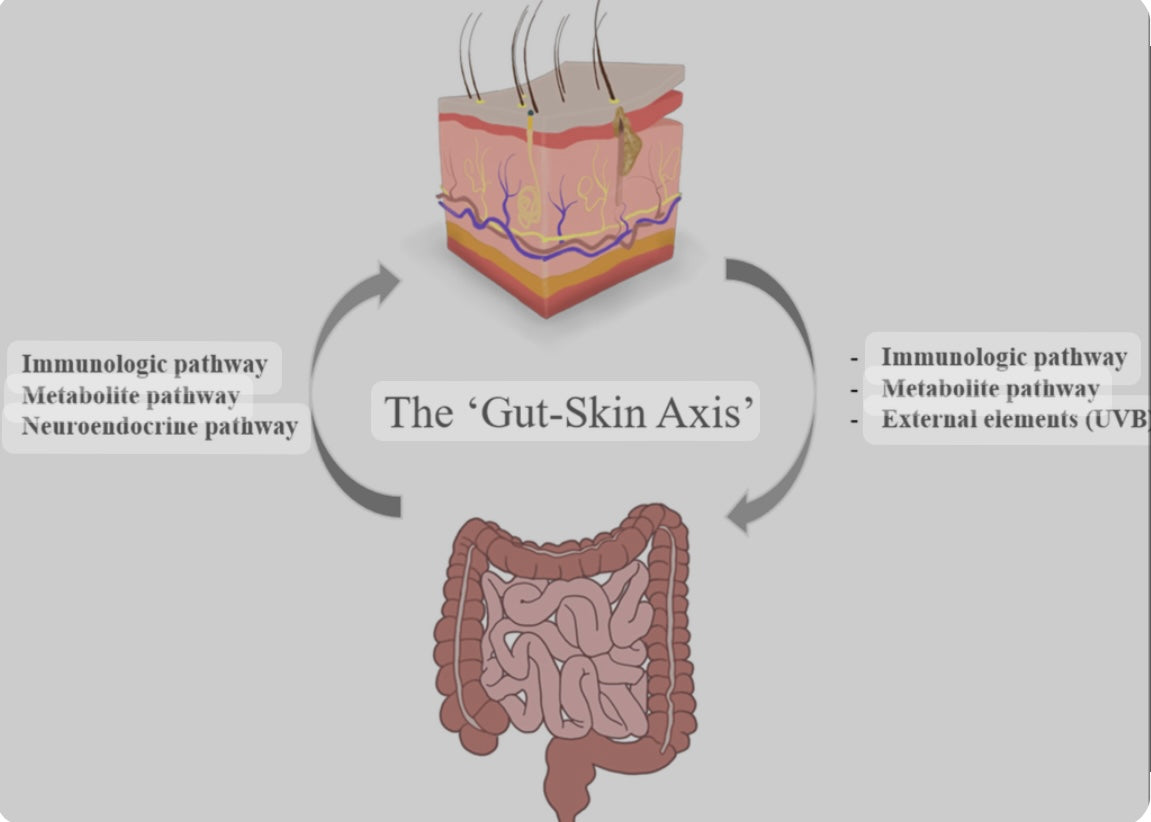Introduction
The concept of holistic health emphasizes the interconnection between different systems within the body. Two systems that have garnered significant attention for their interplay are the skin and the gut. Recent research highlights a strong correlation between skin health and gut health, suggesting that a balanced gut can lead to healthier skin and vice versa. This blog delves into what skin health and gut health mean, the reasons behind their interrelationship, practical steps to achieve wellness in both areas, and the manifold benefits of maintaining a healthy gut-skin axis.
Understanding Skin Health
Skin health refers to the overall condition and appearance of the skin, which is the largest organ of the body. Healthy skin is typically characterized by:
• Even Tone: Consistent color without discoloration or blotches.
• Smooth Texture: Absence of rough patches, pimples, or dryness.
• Hydration: Well-moisturized, not oily or excessively dry.
• Elasticity: Firmness and the ability to bounce back when stretched.
The skin serves as a barrier protecting internal organs, regulating temperature, and enabling sensory perception. Factors influencing skin health include genetics, environmental exposure, nutrition, and overall lifestyle.
Understanding Gut Health
Gut health involves the optimal function of the gastrointestinal (GI) tract, which includes the stomach, intestines, and the microbiota—the community of trillions of microorganisms residing in the gut. Indicators of a healthy gut include:
• Efficient Digestion: Proper breakdown and absorption of nutrients.
• Regular Bowel Movements: Consistency and regularity without discomfort.
• Balanced Microbiota: A diverse and balanced population of gut bacteria.
• Intact Gut Lining: Preventing the leakage of undigested food and toxins into the bloodstream.
Gut health impacts various bodily functions such as metabolism, immune response, and mental health. Factors affecting gut health include diet, antibiotics, stress, and infections.
The Gut-Skin Connection: Why They Work Together
The gut-skin axis refers to the bidirectional relationship between the gut and skin. Several mechanisms underpin this connection:
1. Immune System Modulation: The gut-associated lymphoid tissue (GALT) constitutes a significant portion of the body’s immune system. A healthy gut can modulate immune responses, potentially reducing inflammatory skin conditions like eczema, psoriasis, and acne.
2. Nutrient Absorption: The gut is responsible for absorbing nutrients essential for skin health, such as vitamins A, C, D, and E, omega-3 fatty acids, and zinc. Poor gut health can lead to nutrient deficiencies, adversely affecting the skin.
3. Microbiota Metabolites: Gut bacteria produce metabolites, including short-chain fatty acids (SCFAs) and certain vitamins, which can influence skin health. Dysbiosis, an imbalance in gut microbiota, can lead to skin issues through systemic inflammation.
4. Hormonal Regulation: The gut microbiota can influence hormone levels, including those that affect the skin, such as insulin and androgens. Hormonal imbalances are often linked to skin problems like acne.
5. Detoxification and Inflammation: The gut helps detoxify the body by processing and eliminating waste. A compromised gut barrier (leaky gut) allows toxins to enter the bloodstream, potentially leading to skin inflammation and conditions like dermatitis.
Achieving Health in Both Areas
To promote both gut and skin health, consider the following strategies:
1. Balanced Diet:
• Probiotics and Prebiotics: Incorporate foods rich in probiotics (yogurt, kefir, sauerkraut) and prebiotics (fiber-rich foods like garlic, onions, bananas) to support gut microbiota.
• Anti-inflammatory Foods: Consume fruits, vegetables, nuts, seeds, and fatty fish to reduce inflammation.
• Hydration: Drink plenty of water to maintain skin hydration and support digestion.
2. Avoid Harmful Substances:
• Processed Foods and Sugars: Minimize intake to prevent inflammation and dysbiosis.
• Alcohol and Smoking: Avoid as they can disrupt gut health and damage the skin.
3. Regular Exercise:
• Enhances circulation, supports detoxification, and promotes a balanced gut microbiota.
4. Stress Management:
• Practice mindfulness, meditation, and yoga to reduce stress, which can negatively impact both the gut and skin.
5. Adequate Sleep:
• Essential for cellular repair, hormone regulation, and overall well-being.
6. Skincare Routine:
• Use gentle, non-comedogenic products and avoid over-exfoliation to protect the skin barrier.
7. Gut Health Supplements:
• Consider probiotics, digestive enzymes, and other supplements under professional guidance.
Benefits of a Healthy Gut-Skin Axis
Maintaining a healthy gut-skin axis offers numerous benefits:
• Clearer Skin: Reduction in acne, eczema, and psoriasis flare-ups.
• Improved Skin Texture and Tone: Enhanced elasticity, moisture retention, and even complexion.
• Better Digestion and Metabolism: Efficient nutrient absorption and energy production.
• Enhanced Immune Function: Reduced susceptibility to infections and inflammatory conditions.
• Balanced Mood and Mental Health: Lower stress levels and improved overall well-being.
Conclusion
Understanding the intricate relationship between gut health and skin health is crucial for holistic wellness. By nurturing your gut through a balanced diet, avoiding harmful substances, exercising, managing stress, and adhering to a proper skincare routine, you can achieve vibrant skin and a well-functioning digestive system. The synergy between a healthy gut and skin not only enhances physical appearance but also contributes to overall health, making it a worthwhile endeavor for anyone seeking comprehensive well-being.


